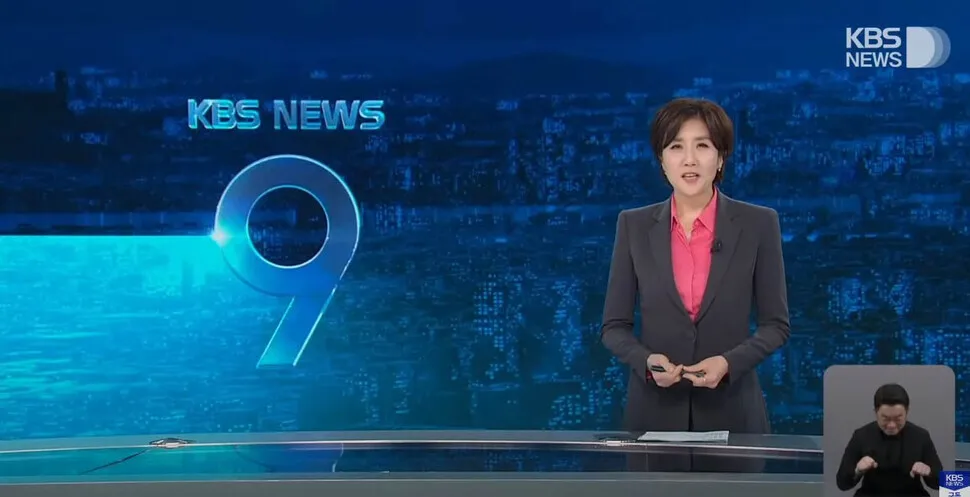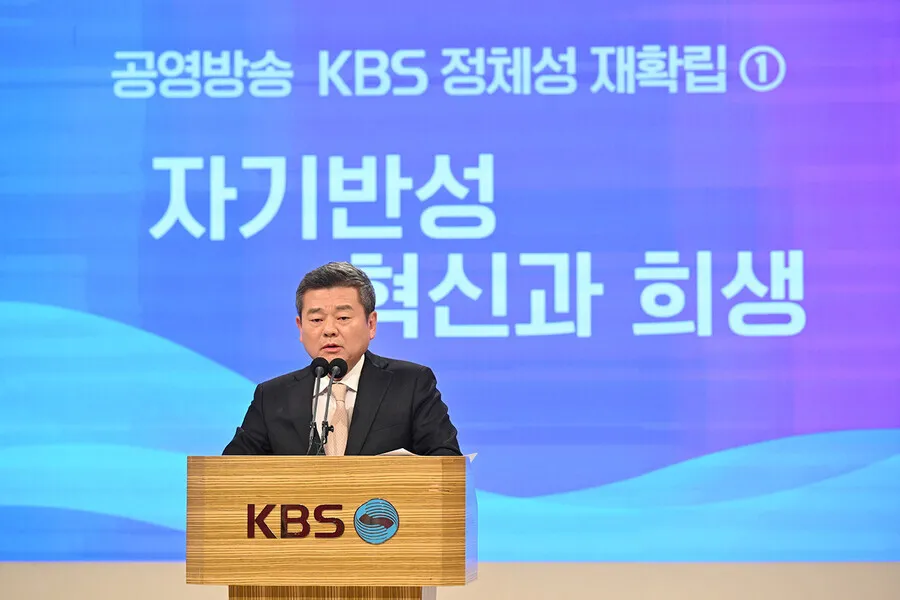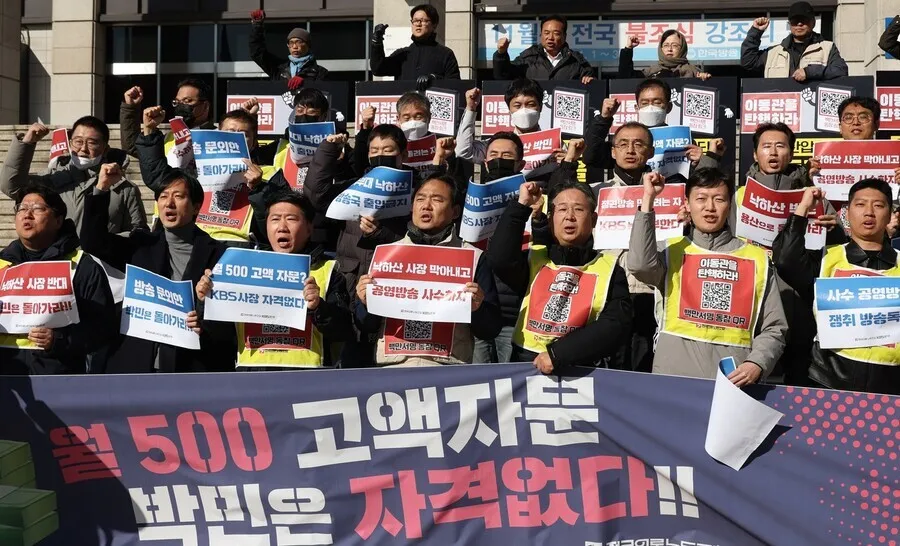hankyoreh
Links to other country sites 다른 나라 사이트 링크
First day on job, Yoon-appointed head of KBS drops programming critical of administration

On his first day as president of the Korea Broadcasting System (KBS), Park Min abruptly dropped a current affairs program that had been attacked by the ruling party as “biased” from its schedule and replaced newscasters, sparking controversy over violations of production autonomy and unjustified personnel changes within the public broadcaster.
The KBS chapter of the National Union of Media Workers held a press conference at the headquarters of KBS shortly after Park’s inauguration ceremony on Monday, where they said that the moves by the new leader “violated the freedom and independence of broadcasting programming guaranteed by the Broadcasting Act.”
The deletion of the current affairs program “The Live” (KBS 2TV) from its scheduled time slot in the evening hours every Monday through Thursday was disclosed to the company through an internal communication network that morning, according to the union.
In a statement, the union said, “KBS deleted the program from the schedule without any discussion with the production staff. Now it may seem as if it is only deleting and replacing the program, but it looks as if the broadcaster has begun the process of canceling the program itself.”
The historical TV series, “Goryeo-Khitan War,” will be rebroadcast in the time slot that originally had been held by “The Live.”
Newscasters were also dropped and anchors were replaced.

According to the union, the nominee to head KBS’ radio broadcasting called the producers of “Ju Jin-u Live” the evening before to notify them that Ju would be leaving the program and even “intimidated” the producers with “talk about company rules” when they refused to comply.
Other replacement notifications were confirmed to have been delivered for Kim Gi-hwa, the presenter who took over a popular radio news broadcast following the resignation of the journalist it was named after, Choi Kyeong-yeong, and Lee So-jeong, who has been hosting the TV broadcast “KBS News 9.”
“Ju Jin-u Live” is one of the main programs the ruling People Power Party has repeatedly accused of bias. Indeed, Ju’s name was mentioned 11 times by ruling party lawmakers and others during Park Min’s confirmation hearing as KBS president on Nov. 7.
Speaking about the program during questioning, lawmaker Park Sung-joong asked, “Can we simply leave these kinds of falsehoods, distortions, fabrications, and manipulations to continue? Shouldn’t we bear the responsibility of punishing them as a warning to others?”
In response, Park said he intended to “take measures to that effect.”
The union said it plans to pursue legal action. The labor-management collective agreement reached at KBS in 2022 states that “the opinions of working-level staff concerning those in charge of programming, production, and reporting must be respected” (Article 22) and that “producers must be consulted before any changes to programming” (Article 31).
Article 4 of the Broadcasting Act also states that the “freedom and independence of broadcast programming shall be guaranteed.”
The union said it plans to file complaints against officials under Park’s leadership for violations of the Broadcasting Act and collective agreement.

The programming changes were accompanied by sweeping personnel changes. Around midnight on Sunday, KBS issued personnel orders to 72 directors of its headquarters, centers and bureaus.
“There’s evidence that they’ve been ordering personnel changes and the replacement of program producers before [Park] even took over as president,” said Kang Seong-won, the director of the KBS chapter of the National Union of Media Workers, in a telephone interview with the Hankyoreh on Monday.
“They’ve gone about it so aggressively that the anchor of the 9 o’clock news did not even have a chance to say goodbye to viewers,” he explained, adding that he had “never seen anything like this since joining the network.”
In his inaugural address Monday, Park said there would be “no place at KBS going forward for those who view public broadcasting as a platform for realizing the ideology or convictions of individuals or groups.”
He also stressed the need to “stamp out vices that waste license fees,” referring to fees paid by the public.
On Sunday, Park was appointed the 26th president of KBS by South Korea’s president, Yoon Suk-yeol. He was scheduled to address the South Korean public in a press conference on Tuesday.
By Park Kang-su, staff reporter
Please direct questions or comments to [english@hani.co.kr]

Editorial・opinion
![[Editorial] Korea awaits verdict that will bring Yoon to justice [Editorial] Korea awaits verdict that will bring Yoon to justice](https://flexible.img.hani.co.kr/flexible/normal/387/232/imgdb/original/2026/0114/2717683786156022.jpg) [Editorial] Korea awaits verdict that will bring Yoon to justice
[Editorial] Korea awaits verdict that will bring Yoon to justice![[Editorial] Starting small will be key for Lee’s big vision for cooperation with North Korea [Editorial] Starting small will be key for Lee’s big vision for cooperation with North Korea](https://flexible.img.hani.co.kr/flexible/normal/500/300/imgdb/original/2026/0114/1717683780759382.jpg) [Editorial] Starting small will be key for Lee’s big vision for cooperation with North Korea
[Editorial] Starting small will be key for Lee’s big vision for cooperation with North Korea- [Column] Surviving our era beyond the looking glass
- [Column] Welcome to the age of corridors
- [Correspondent’s column] Risks and opportunities in Xi’s gesture to Korea
- [Column] The pretexts of the powerful
- [Column] Why do working-class young people fall for the far right?
- [Editorial] A step in the right direction for South Korea and China
- [Column] Lee’s efforts to write a hopeful new chapter for inter-Korean relations
- [Column] What ‘innovation’ by Coupang’s Kim Bom-suk missed
Most viewed articles
- 1[Interview] Judith Butler: Repressive acts by anti-democratic regimes are ‘confessions’ of fear
- 2‘KPop Demon Hunters’ takes home Golden Globes for animated film, best original song
- 3Korea, China and Japan must find ‘common ground’ and communicate, says Lee
- 4Yoon offers more rationalization, not remorse, in final statement of insurrection trial
- 5Korea, Japan agree to identify remains of those killed in Chosei mine disaster
- 6Special counsel demands death penalty for Yoon in insurrection trial
- 7Why prosecutors are seeking the death penalty for Korea’s former president
- 8[Editorial] Korea awaits verdict that will bring Yoon to justice
- 9Naver unveils HyperCLOVA X in bid to become early leader in Korea’s AI ecosystem
- 10Lee proposes 4 major projects to China, including Seoul-Pyongyang-Beijing high-speed rail